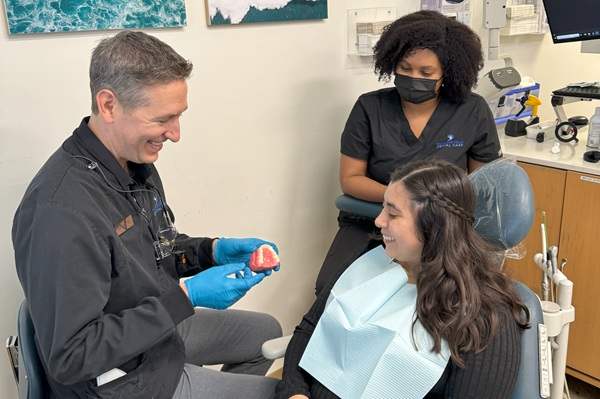How a Cavity Causes a Toothache

Experiencing a toothache is not a pleasant experience. Some toothaches are minor, but many have accompanying pain that can be difficult to bear. Sometimes, the symptoms can be so excruciating that you cannot function properly. Often, a cavity is the cause of pain in and around the tooth. It is helpful to understand how cavities do this. You can also learn preventive measures to keep tooth decay away.
An explanation of cavities and how they form
Before exploring more about toothaches, it is helpful to understand more about cavities. These are small holes that form on the surface of teeth due to decay. Poor brushing and flossing are the major causes of cavities. After eating, sugars and starches remain on the teeth. By not removing these, a sticky film called plaque can form. This can harden into teeth-destroying tartar.
The tartar attacks the enamel layer of the teeth. Untreated, cavities can grow and affect more of the tooth. Eventually, the decay can reach the pulp of the tooth, which contains nerves and blood vessels. At this point, the tooth’s structure and function can fail and be at risk of breaking or falling out.
An overview of a toothache
Toothaches are common ailments that people of all ages can have. Many times, toothaches are minor, and the pain subsides quickly. However, as cavities grow and increase in severity, so can the pain. The pain can be in and around the tooth and may feel worse when eating or drinking hot or cold foods and beverages. Sometimes, the pain can be so intense that it keeps the person up at night. The feelings can be throbbing or shooting through the jaw and even up into the face.
Getting deeper into the tooth
The most severe toothaches occur when tooth decay increases. When cavities reach the pulp of the tooth, the toothache can be more persistent and serious. This chamber contains nerves, blood vessels, and other tissue. The nerves have endings that are extremely sensitive to pain. As decay grows into this area, the pain may manifest itself as a throbbing, shooting feeling. It can also cause inflammation around the tooth.
Pain while biting down
Sometimes, a toothache can make it painful to eat. The action of biting down may be uncomfortable because of damage to the surface of the tooth. Larger cavities will produce visible holes on the biting surface. Biting can aggravate the pain. Also, food can get into the holes, further irritating the tooth.
Prevention
Toothache prevention is highly possible with good daily habits. Brushing at least twice a day with fluoride-based toothpaste will keep cavities away. Daily flossing will prevent the accumulation of bacteria in the mouth. People should also limit the amount of sugar they eat. Also, visiting the dentist every six months for a professional teeth cleaning will reduce a person’s risk of having toothaches.
Preventing cavities should prevent toothaches
Toothaches are not a pleasant experience. Even minor bouts with them can be uncomfortable. The more you understand the connection between cavities and tooth pain, the more prepared you can be. Commit to good oral hygiene and see your dentist regularly to maintain good health.
Request an appointment here: https://www.diamondheaddentalcare.com or call Diamond Head Dental Care at (808) 450-2101 for an appointment in our Honolulu office.
Check out what others are saying about our dental services on Yelp: Toothache in Honolulu, HI.
Recent Posts
General dentistry aims to keep your teeth and gums healthy by educating you about proper oral hygiene and performing preventative treatments that protect against issues like gum disease and tooth decay. The American Dental Association recommends going to the dentist at least two times per year. These visits are used to evaluate the condition of…
Everyone should visit the general dentist twice a year. At these visits, the dentist can catch any oral health issues and treat them before they become more serious. During the visits, usually once a year, you will need x-rays to check on the parts of your mouth that your dentist can’t see with the naked…
If you have a broken tooth, it may not necessarily be a dental emergency. In the absence of pain, excessive bleeding, or a tooth that is knocked out completely, you can schedule an appointment at your convenience and do not need to see the dentist immediately. In most cases, broken teeth can be caused by an…
A toothache can be mild, moderate, or severe. Persistent discomfort or pain in the mouth is the first sign that there is an infection, cavity, or injury in the affected tooth. This is when you must see your general dentist right away. Here are the details about seeing a dental care professional about a toothache.Constant…


